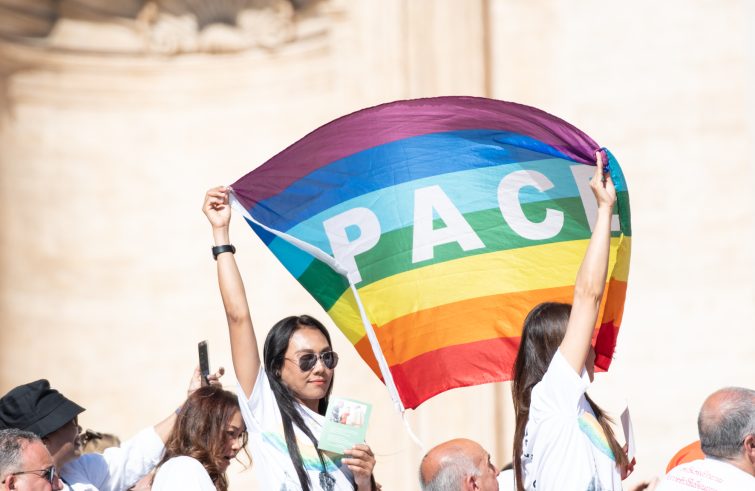US President Donald Trump has announced that negotiations will have to begin “immediately”, pushing for a solution on Ukraine. Zelensky: “Nobody wants peace more than Ukraine”, while German Chancellor Olaf Scholz said he would reject a “peace imposed” on Ukraine. Everything is coming to a head shortly before the Munich Conference, which will bring together sixty heads of state and international political and military experts in the German city to discuss relations between the European Union and the United States, military spending and, above all, the start of negotiations for peace in Ukraine. SIR asked Francesco Vignarca for his views on the subject
“We can perhaps call it ‘diplomacy’, but we certainly can’t call it ‘peace.’ In my view, the United States, engages in some form of diplomatic activity solely for its own benefit – a practice that has been customary for some time. This is particularly evident in the case of President Trump, who is keen to demonstrate his strength in the early days of his presidential term”, said Francesco Vignarca, campaign coordinator of the Italian Network for Peace and Disarmament, contacted by SIR to comment on the Trump-led US administration’s attempts to end the conflict in Ukraine, amid phone calls with President Putin and peace plans. The International Security Conference opens today in Munich, still reeling from Thursday’s alleged terrorist attacks, with sixty heads of state, international political and military experts expected to attend talks on EU-US relations, military spending and, most importantly, the start of peace negotiations for Ukraine. Vignarca commented: “This is also reflected in the nature of the proposals being made. They show little regard for international law or for the will of the peoples concerned. In this respect, the portrayal of Trump as a pacifist is completely wrong. Peace, as we know, is not just the absence of war. It is about respect for rights. It’s about justice, it’s about long-term solutions. Whereas Trump only serves his own interests. Granted, the cessation of war is welcome in any case. But those of us who come from the world of non-violence know that this is not the ultimate goal. It may be a starting point, but it is not the goal of a peace that is just, lasting and, above all, supportive of human rights.”
Every avenue must be explored for the sake of peace. But at what cost? Is there a fundamental rule that must always be respected?
Nothing is lost with peace; all can be lost with war, said Benedict XVI. Pope Francis and Cardinal Matteo Zuppi: “War is always a defeat.” Respect for human rights, starting with the right to life, is the primary rule that must never be violated. That is why we have consistently argued that peace can never be built on violence. This is what we call positive peace. When peace is part of a process that strengthens people’s rights, the perspective changes and so do the tools.
What are the risks of a contract-based, imposed peace?
An imposed, contract-based peace is not peace. That is exactly what happened in Europe in the past. Let us remember the period between the First and Second World Wars, with the Versailles agreements. Those agreements disregarded the will of individuals and peoples and were based on the interests of those in power. Unfortunately, they served as the basis for the tragedy of the Second World War. Agreements have a formal and diplomatic aspect, but this should be included in a process for the empowerment of communities and peoples.
This is true peace: the peace that is created and developed when people have confidence in what is being done.
If that doesn’t happen, there is a danger that Putin’s handshake with Trump and the agreements they are forging to the exclusion of everyone else will be seen as a way of making peace, and perhaps even celebrated by those individuals who are far from being pacifists or peacemakers.
Where is the EU and why isn’t it present?
The European Union, especially in the eyes of the peoples who experienced the death and destruction of their communities, is the major absentee of the last three years.
The EU is absent because it never had the courage to go the extra mile. Under the thumb of an occasionally visionless political establishment, it has become a board of directors. We are in danger of becoming a fragile continent, unable to stand united, unable to overcome our differences and form a common front. We need vision and, above all, the strength to start anew from the Ventotene Manifesto and the Schuman Declaration, from the fundamental principles of a Europe that saw itself as strong because it was free from the yoke of war, of militarisation, from the yoke of seeing power only as economic and military power.
What is the starting point for a true peace, a just and lasting peace?
The people, the peoples, those who have suffered, those who have rejected war, that’s the starting point. There are so many conscientious objectors, in Russia, Ukraine, Belarus. Most importantly, we should start by defining what we mean by “peace” and the criteria for achieving it. We often talk about national interests. What are they? Who defines them? That must be our starting point. Societies have progressed throughout history, they have become more democratic and more just when they came together and tried to understand collectively what was best for their communities, when they put aside the rhetorical slogans of some people whose sole purpose was to serve their own interests, when they identified the interests of the community. Pope Francis has repeatedly underlined that peace cannot be built without social justice, without rights for all, without respect for the environment. In addition to concrete actions in the context of countries at war, there is a need for a global rethinking of the global understanding of peace.
